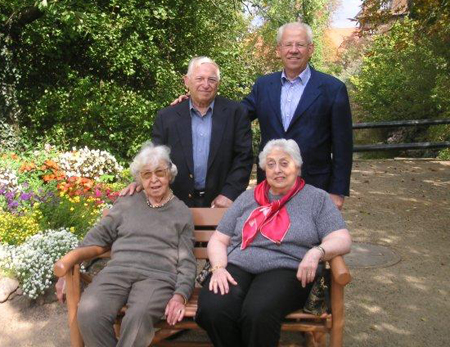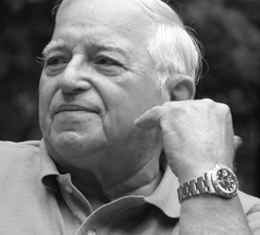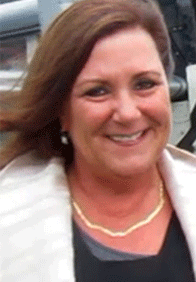Where
In The World Is Joe Berg?
 Standing
left to right, Joe Berg and Dieter Bloch, adi-Consult based in Cologne.
Seated from left Ursel Standing
left to right, Joe Berg and Dieter Bloch, adi-Consult based in Cologne.
Seated from left Ursel
Jahnke (Joe's long-time secretary) and René Berg.
Joe Berg, a dreamer and a doer who graced
the air cargo industry with his intelligence, charm, diligence and hard
work for half a century, and by any measure can be counted as part of
that small cadre of true pioneers of the form of air freight forwarding,
is alive and well and living in Stamford, Connecticut.
Joe once operated a Connecticut company
called Air Express International “Wings & Wheels.”
Along the way, he changed the way the
world did air cargo forever.
Although the song of a grand lifetime
career has ended, the melody lingers on.
But that is just the mark of the man.
His friend, Guenter Rohrmann, tells us
what it is about Joe Berg:
“Out of the AEI family emerged a
truly remarkable leader whose thoughts and actions impacted the methods
and standards of international air commerce.
“Forty-eight years ago, I came to
know Joe as a professional and even more importantly, as a profound
human being.
“He was able to do things and walk
in places for the first time that changed air commerce forever.
“Together with the late John Emery
Jr., Joe brought about a fundamental change that continues today as
a matter of fact in air cargo, when the two ‘competitors’
teamed up and fought the old USA Civil Aviation Board (CAB) and created
the method under which commissions would be paid to agents on consolidations.
“In 1978, as the airline business
in USA was deregulated and some smaller cities lost airline service,
Joe was out front as the driving force behind creating an all-cargo
airline that would serve those cities.
“Although commitments were made
to share profits and losses from a large domestic competitor, the partnership
unfortunately was not continued.
“But the gauntlet had been thrown
down and AEI was an air cargo business innovator and concerned shipping
partner in deeds and well as words.
“Perhaps of all the lasting contributions
Joe gave to air cargo, none has been as far reaching as the creation
of the Logis AEI Global IT System.
“Logis AEI changed everything when
with vision and complete dedication, Joe forged a great IT system out
of the 20 or so systems that existed and were in use throughout the
AEI world.
“In 1981, Joe Berg brought revolutionary
IT to AEI and air cargo.
“But behind it all, Joe Berg is
also a great human being.
 “He has a keen eye for opportunity
and the ability to see both sides of a question and more than enough
courage to innovate and lay down new paths.
“He has a keen eye for opportunity
and the ability to see both sides of a question and more than enough
courage to innovate and lay down new paths.
“Joe is also warm and ethical to
the core, easy in one-on-one relations, tough when the situation demands,
and also open to new ideas.
“Simply put, Joe Berg shaped AEI
in his own image and although things changed after he departed, his
presence was always keenly felt and his influence was never lost.”
Joseph N. Berg was born on April 26, 1927,
in Newport, Rhode Island but was raised in Camden, NJ, graduating from
Camden High School where he was a successful athlete, having lettered
in Track & Field, Football, and Baseball.
He enlisted in the U.S. Army in the spring
of 1945, and returned to civilian life in spring 1947.
He attended undergraduate classes, first
at the University of Richmond on a football scholarship and under the
G.I. Bill, but completed his degree in Romance Languages from Mexico
City College in 1950.
He also attended the University of Pennsylvania
for some graduate level work, but later rounded out his studies at a
Harvard Executive Education program in 1987.
He was an accomplished Weight Lifter,
winning Gold Medals in the 1947 and 1948 Virginia State Championships.
He married René Neibart in March
1952, and together they have three sons (Jonathan, Donald and Paul).
Joe's first job came as a salesman selling
Penn Fishing Reels in Philadelphia in 1950, but he first joined the
air freight business with the Peter Bernacki Company in Philadelphia,
where he worked from 1950 to 1955.
In 1955 he then joined Air Express International
(AEI), establishing a Philadelphia office and becoming its District
Manager.
Air Express transferred him to Idlewild
(JFK) to become Station Manager in 1960, and then again on to Frankfurt,
Germany in 1963 to assume the role of Vice President for Europe, Africa
and the Middle East.
After spending two years in Paris with
the same title, he later returned to Frankfurt before returning to the
U.S. with this family in 1969.
In 1969 Joe became a Vice President with
Circle Air Freight, a position that he held until becoming the President
and CEO of Air Express International in 1973.
After 12 years as President, he retired
from Air Express in 1985 and again returned to Circle International,
becoming its USA President from 1986 to 1989.
In 1991 he joined Dynamic Air Freight
as its President until 1992.
After several years of partial retirement,
he joined with the International Executive Service Corps (IESC) and
performed as a consultant on location with assignments in Cairo, Egypt
in 1994; Siberia, Russia in 1995 and again in 1996; and in the Ukraine
in 1997.
Joe is a multi-linguist, with perfect
fluency in both Spanish and German, and a strong working knowledge of
French and Russian.
He has been an avid hunter and sportsman,
having been on several safaris to Africa and Australia.
His work and leisure have repeatedly brought
him to more than 75 countries on six continents.
He has been a lifelong collector of both
stamps and books, and has amassed one of the largest private libraries
on African hunting and exploration.
Guenter Rohrmann concludes:
“The name Berg in German translates
into English as ‘mountain.’”
As it happens, that is exactly what Joe
Berg is to hundreds, even thousands of people in and out of air cargo
and elsewhere during his life.
Joe is a solid rock of a human being,
a mountain of forward-thinking leadership and unselfish decency.
Keep on keepin’ on, dear Joe.
Geoffrey/Flossie
|



